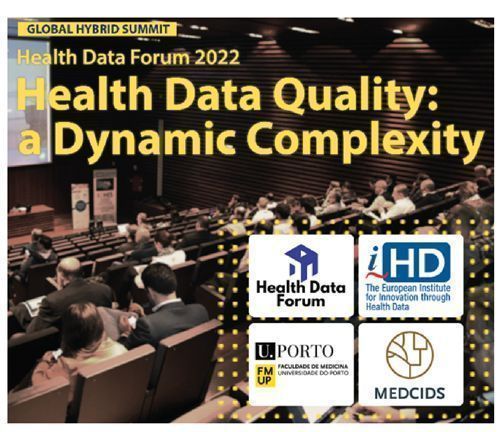HealthManagement, Volume 23 - Issue 1, 2023
Key Points
- Data quality is an evolving requirement that needs to be redefined over time and over different projects. That is why i~HD refers to this as a dynamic complexity.
- Obtaining high-quality data seems evident and straightforward, unfortunately, this does not appear to be the case in a healthcare setting.
- Assessing, labelling, and improving the quality of health data is the responsibility of all stakeholders.
- Howi~HD, a multi-stakeholder collaborative, finds itself in a prime position to facilitate the development of 'best practices’ in collecting, storing, using and re-using health data quality.
I.Health Data Quality, a Science on its Own
A. High Quality of Data Implies TRUST
Data quality is about having confidence in the quality of the data that you record and the data you (re)use. In research, data quality is consistently described in terms of its “fitness for purpose/use”.
To assure that the data is of the highest quality and that it is usable, it has to meet some fundamental requirements (e.g., the data has to be complete, correct up to date...). We call these data quality dimensions. In order to describe and evaluate the complex multidimensional aspect of data quality, research has tried to define data quality dimensions. But at this point, there is still little agreement about the exact definition and meaning of data quality dimensions.
During a series of workshops with clinical care, clinical research and ICT leads from 70 European hospitals, the European Institute for Innovation through Health Data (i~HD) identified nine data quality dimensions. These nine data quality dimensions were deemed most important to assess the quality of health data if this data is to be useful for patient care, for organizational learning and research.
Data quality is an ever-changing requirement that needs to be redefined over time and over different projects. That is the reason why we refer to data quality as a dynamic complexity. Data quality is defined within the context of these requirements. The quality of clinical data should therefore be regularly assessed and reassessed in an iterative process to ensure that appropriate levels of quality are sustained.
A. Small Errors, Major Impacts
Obtaining high-quality data seems evident and straightforward, unfortunately, this does not appear to be the case.
Several studies have highlighted significant issues regarding the availability and quality of data in the electronic health record (EHR). In a survey conducted in 2020, 22 889 patients read their ambulatory visit notes in order to assess the frequency and types of errors within these notes. Of these patients, 21.1% reported a perceived mistake and 42.3% reported that the mistake was serious. Unfortunately, these errors in EHRs are common, and many of these errors are related to medications (Bell et al. 2020).Another example shows us that paediatric patients less than 2 years old and those in the intensive care units were at the greatest risk for medication errors, and incorrect dosage was found to be the most common error made (Weir at al. 2003).
To unlock the full potential of (re)using real-world data regarding primary (for example, clinical decision making) and secondary (for example, clinical research) use, it will be important to realise that data quality is not only about measuring and assessments. While measurement is an integral part of the data quality journal, it also involves the management of people, processes, policies, technology, and standards within a hospital or GP clinic. Obtaining, maintaining and improving data quality is not a one-man job. It is important to note that all stakeholders, including patients, within the healthcare ecosystem should actively participate in the data quality effort. In short, we need all stakeholders!
II. We Need ALL Stakeholders!
Data quality is not only a relationship between the healthcare provider and his patient. i~HD brings all stakeholders within the healthcare ecosystem together in a neutral forum, so that they can learn from each other, share challenges, and work with us and our network of European experts to develop solutions that enable us to scale up the quality of data and the (re)uses of health data.
Not only do patients and clinicians want health data to be safe, rapid and evidence-based, regulators and health technology assessment agencies also want to trust real-world evidence in decision-making. Healthcare funders need good-quality data to reward high-quality and value-based health care. Meanwhile, industry wants to re-use routinely collected health data to accelerate clinical research. Public health agencies need reliable data to guide healthcare and prevention programmes and policies. Data quality contains the effort and awareness of all these stakeholders involved in the ecosystem. And the quality can only be improved if all stakeholders are motivated to improve and invest in this data quality journey.
Assessing, labelling and improving the quality of health data is critical for all stakeholders to achieve our collective ambition to scale up the availability of trustworthy, reliable data that can improve the quality and safety of health care, maximise the efficiency and resilience of health systems, provide evidence for public health and prevention strategies and policy-making and accelerate research and foster innovation. It can also be used as input to calculate the economic and societal returns of health interventions.
III. Solutions Provided By i~HD
A. Education and Awareness
Because of i~HD’s multi-stakeholder collaborative approach, the organisation finds itself in a prime position to facilitate the development of best practices in collecting, storing, using and re-using health data quality. This topic, for example, is featured as one of the courses available on the i~HD e-Learning Platform, a part of the i~HD Academy.
i~HD, in collaboration with the University of Porto and the Health Data Forum and its partners, recently held the “Health Data Quality: a Dynamic Complexity” conference, the first international conference ever held on the topic of health data quality. The conference’s objective was to demonstrate the dynamic complexity of high-quality data for primary as well as secondary use. This event attracted over 400 experts and participants from multiple public and industry organisations and stakeholders, including representatives from key policy-making bodies such as the European Commission, WHO, and national governments.

B. Save the Date
Due to the success of this event, i~HD is already planning the i~HD Annual Conference 2023. Aside from taking off from the key points discussed during the health data quality event held in Porto last year, the 2023 conference will also encompass other important aspects to facilitate the optimal re-use of health data like information governance and trustworthy software systems.

This year’s edition of the i~HD annual conference will be held in the historic city of Ghent, Belgium from the 29th of November to the 1st of December.
C. i~HD Porto Declaration on Health Data Quality 2022
Another result of the Porto conference is the framing of the i~HD Porto Declaration on Health Data Quality 2022. This declaration calls on all stakeholders to urgently collaborate on agreeing on the standards for data quality assessment, scaling up data quality labelling of primary and secondary use data and strategies for shared investments to improve the systems and delivering training to the personnel needed to ensure the best possible health data across Europe. It emphasises joining forces to ensure the best possible health data for Europe.
The power of this declaration depends on the stakeholders that support it. The invitation to endorse the declaration is still being extended to interested organisations. This may be done by visiting https://i-hd.eu/ihd-porto-declaration-on-health-data-quality-2022/ or sending a mail to [email protected].
D. Data Quality Expert Group
Aside from its educational and awareness campaigns on health data quality, i~HD has also taken early steps in forming the Data Quality Expert Group. This will be a multi-stakeholder collective which will promote, develop and share good practices for assessing, labelling and improving the quality of health data. This endeavour is also an answer to one of the five sections (containing 10 total action points) enshrined in the i~HD Porto Declaration on Health Data Quality 2022 where it addresses the engagement and support of secondary use stakeholders to invest in education and help the organisational changes which are needed to improve the data quality at the source.
IV. Conclusion
High-quality data is not a “nice-to-have” requirement but a “must-have” requirement. Achieving high-quality health data in our healthcare ecosystem is neither a simple task nor a one-man’s job. It involves the management of people, processes, policies, technologies, and standards. If we can share the burden and the effort, we can also share the rewards and benefits of high-quality health data for Europe. Because data without quality can neither add value nor serve a useful purpose.
Conflict of Interest
References:
BellSK et al. (2020) Frequency and Types of Patient-Reported Errors in Electronic Health Record Ambulatory Care Notes. JAMA network open. 3(6): e205867.
Weir C R et al. (2003) Direct text entry in electronic progress notes. An evaluation of input errors. Methods of information in medicine. 42(1): 61–67.





